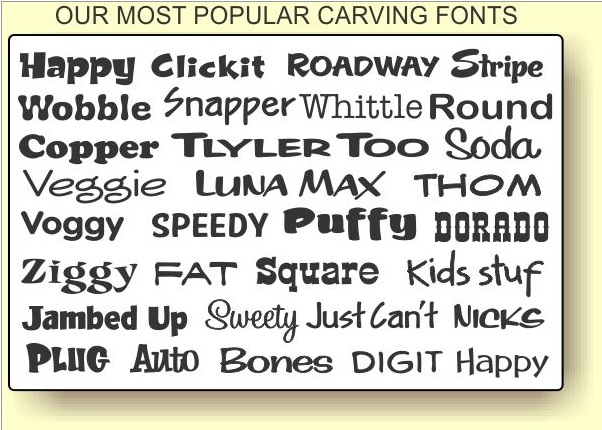For questions, comments or ordering please email ray@rayswoodworking.com. I would love to hear from you! |
All Guides - Start Here
Beginning
Setting Up Guide
Marketing Guide
Tools
Tool Guide
Tools
Wood
Wood Guide
Carving Guide
Finishing Guide
Sign Designs
Sign Shapes
Shape Dimensions
Methods
Background Guide
Design Guide
Layout Guide
Shipping Guide
|
Reminders
Be sure to make enough room for the 90 deg by:
- Lowering the profile bit and make another deeper cut
- Follow the outside edge of the first cut, not in the same groove
- Stay to the outside of all previous cuts
- Tight areas = 60 deg bit which doesn't cut as wide
- Use larger routers if possible, but small routers do ok on shallow or small signs
- Do not go deeper than 1/4 inch unless specific projects
- As you get used to it, move closer to the line
- High spots = not deep enough, circles too big or over sanding
- Large circles can leave more high spots
- Low room? use dimple effect on small letters or insides
- Profile bit creates lines. Do not try to eliminate the line! stay away.
- Draw the cloud first, then cut the cloud next, then outside of the letters, then insides
- Deep 90 = nice step along the edges. smooth cuts beginning to end keep the steps intact
- Deep cloud line ensures an even step around the cloud
- Again; circles as patterns for texture are governed by high spots
|
Background Effects
Dimple effect:
- Small patterns & tight spots
- Whole background? plan on 4 - 5 hours = gifts
Standard Background:
- 90 bit - use large circles; small circles remove too much wood and leave no contrasts
- Keep textured bottoms, not smooth to reflect light and show depth of cut
Power carving with a flexible shaft:
- Uses rotary burr bits
- Scours out wood in a hurry
- Contours in the wood are flexible and designable
To emulate the effect with a router:
- 90 deg to draw horizontal lines following the top rule lines
- Lift router after each pass
- Remove material between letters horizontally, NOT CIRCULAR
- Lines between letters do not have to line up
- No high spots; Make sure there is no material between the lines
- Make sure one line does not run into the next. Keep lines separate
- Lines can wander a little bit but try to stay parallel
- Following the grain is ok
|

